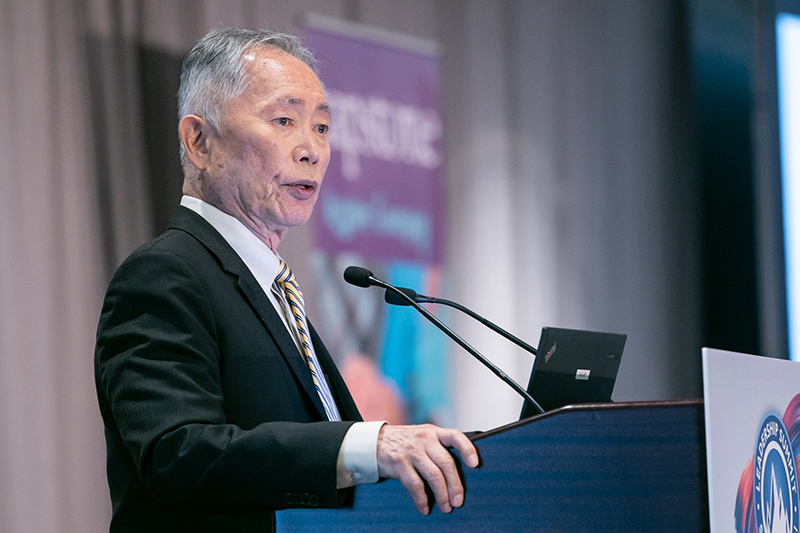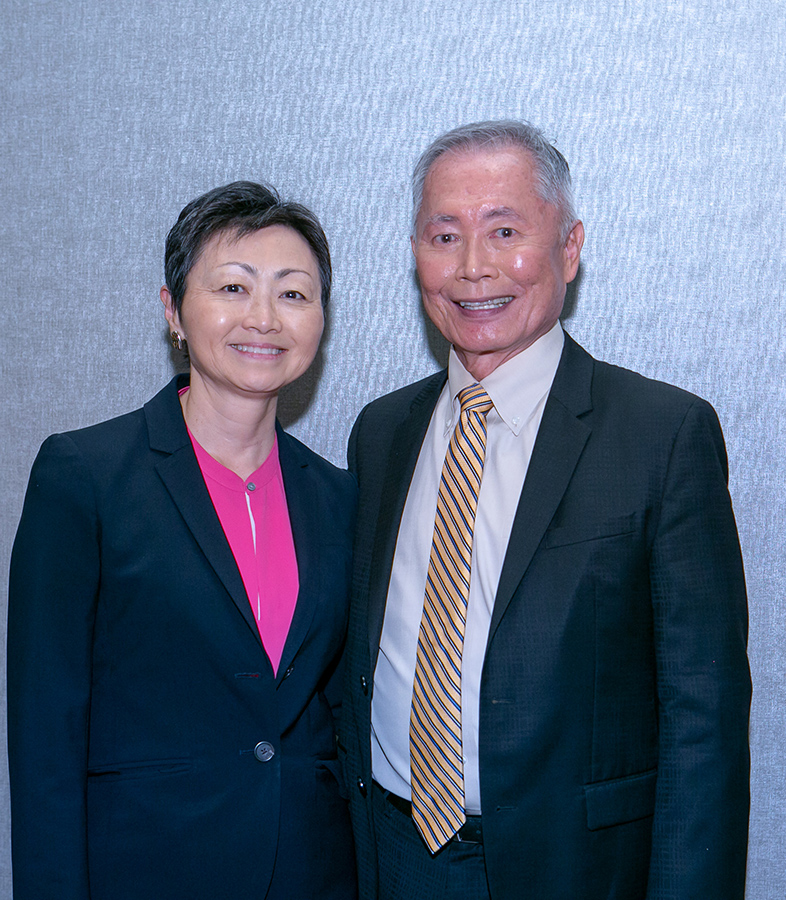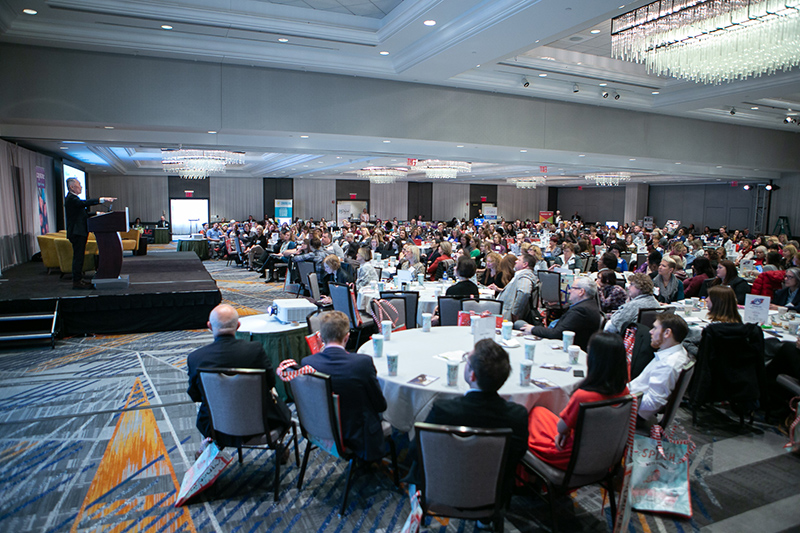Takei Opens SLJ Summit With Emotional, Inspiring History Lesson
The actor and activist inspired a room of educators with an opening keynote address at the SLJ Leadership Summit.
 |
| Photos by Jeffrey Holmes for SLJ. |
Actor and lifelong activist George Takei opened the SLJ Summit with a keynote address that began with gratitude.
"This is an opportunity for some to say thank you to librarians because they affected me a great deal growing up," he said, noting the library on wheels from his childhood and those who helped and guided him in his later years.
"Librarians I have always seen as the keepers, as well as dispenser of knowledge," he said. "That knowledge helped educate me, inspire me, and to get me to be engaged with our society and the world we live in."
Takei came with more than a message of thanks, however. His address, which was at times emotional, defiant, hopeful, and humorous, gave those in attendance a history lesson—one that will be taught through his graphic memoir, They Called Us Enemy, which will be released next summer. The book recounts of Takei's years in a Japanese-American internment camp during World War II. It's a story he retold to a rapt audience in a ballroom at the Brooklyn Bridge Marriott Saturday morning. It is a chapter in American history that still doesn’t always have representation in history books, and one that has relevance in today's political world as well.
"The lessons of the past are so easily forgotten, and the mistakes of the past are repeated time and again, especially in these fraught times we live in today," he said.
The actor known most for his role as Sulu on the original Star Trek series discussed the progression of his life after Japan bombed Pearl Harbor when lives of Japanese Americans changed “cataclysmically.”
"Overnight, we were looked at with suspicion and fear and outright hatred," he said. “This nation was swept up in war hysteria and racial prejudice.”
First came a curfew, then the freezing of bank accounts, and finally President Franklin D. Roosevelt signed an executive order for internment camps for Japanese Americans. It took a couple of months from the executive order to the soldiers arriving at the Takei’s family home in the Los Angeles area.
“Due process, the central pillar of our justice system, simply disappeared,” he said.
Early one morning as he and his younger brother looked out the window, two armed soldiers walked up their driveway and banged on the family’s door.
“That sound, that terrorizing sound, reverberated throughout the house,” he said.
At gunpoint, his father, Takei, and his younger brother were taken to the driveway, where they waited for their mother and infant sister.
"When she emerged from the house, she had our baby sister in one arm, a huge duffle bag in the other and tears streaming down her cheeks," he said. "That was a terrifying morning that is seared into my memory.”
As are the images from the internment camps where he would live for approximately three years.
 |
|
SLJ's Kathy Ishizuka with actor and activist George Takei at SLJ's Leadership Summit. |
"I still remembered the barbed wire fence that confined us, the tall sentry tower with machine guns pointed at us," he said. "I remember the search light following me when I made night runs from our tarpaper barrack to the latrine. But, for me, I thought it was nice that they lit the way for me to pee. I was a kid, and children are amazing adaptable. What would have been grotesquely abnormal became my normality behind those barbed wire fences."
He began each "school" day with the Pledge of Allegiance.
"I could see the barbed wire fence and the sentry tower right outside my school room window as I recited the words, 'With liberty and justice for all’—too young to feel the stinging irony in those words.”
Takei spoke with emotion of the men who wouldn't go to join the segregated Japanese-American military unit that fought in Europe, but instead asked to go into the units where their friends and neighbors were fighting in their rightful place as part of those American communities.
"It was a gutsy stance, a principled stance, a very American stance and, for that, they were tried for draft evasion, found guilty, and transferred from an internment camp to Leavenworth Federal Penitentiary," he said. "I honor them and I’m as proud of them as I am of those who fought on the European battlefields. They are heroes."
Coming home was the worst part of it all, Takei said, as Japanese-American families fought through poverty to try to regain the lives that were taken from them.
"When I became a teenager, I became very curious about my childhood imprisonment and I became a voracious reader," he said. "I went to libraries. I searched in history books, civics books and found very little about my childhood imprisonment."
So he peppered his father with questions (and passed some judgement on his father for not going fighting for his rights as an American) in after-dinner conversations. He learned that part of history from one of the men who suffered "the anguish, the degradation, the loss, the outrage the most in our family."
 |
His father was a hopeful man who a deep belief in the ideals of America.
"He told me despite all the horrors we went through, American democracy is still the best form of government, because it’s a peoples’ government," Takei recounted. "The people have the intention to do great things. Our democracy is existentially dependent on people who cherish those noble ideals and actively engage in the process of government."
Takei’s father brought him to the headquarters of Adlai Stevenson’s 1952 campaign for president, and the future actor threw himself into the campaign. He would be active in politics, social justice, and civil rights from that moment on.
"Alas, he didn’t win," Takei said of Stevenson. "But my father said in a people’s democracy, you never give up. You keep on keeping on."
Takei has kept on for decades and is now a force of activism and resistance, a maker of "good trouble" on Twitter and in speaking engagements such as the SLJ Summit. He hopes the graphic novel will engage young people and give them a full look at history and a desire to fight to keep it from repeating.
"Next year, we will put it in your hands, you librarians, to build the future of America, to inform the young people who will become the leaders of our future that we have a glorious history but we should also be mindful of some of the horrible mistakes that we made," he said. "As Americans, we all have a responsibility to build a better America."
RELATED
The job outlook in 2030: Librarians will be in demand
The job outlook in 2030: Librarians will be in demand
ALREADY A SUBSCRIBER? LOG IN
We are currently offering this content for free. Sign up now to activate your personal profile, where you can save articles for future viewing






Add Comment :-
Be the first reader to comment.
Comment Policy:
Comment should not be empty !!!